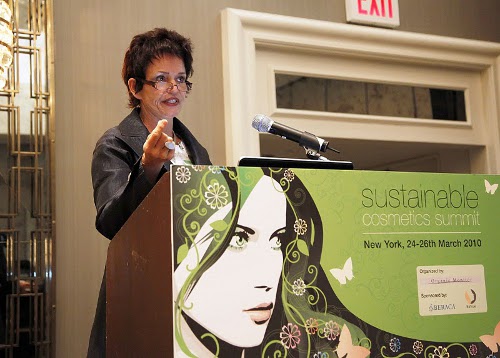On the occasion of the New York edition of the Sustainable Cosmetics Summit [1], leaders and trendsetters of the natural personal care industry in the USA shared their views and opinions on the different pathways to sustainability. With the North American natural personal care industry dogged by green-washing accusations, they called for companies to authenticate their natural and organic products by adopting sustainability initiatives and consider third party certification.

Pathways to sustainability
Horst Rechelbacher, founder of Aveda and Intelligent Nutrients, opened the 2-day conference by encouraging cosmetic companies to remove synthetics from their product formulations. However, Dr. Liliana George from Estée Lauder Companies recalled that “using natural and organic ingredients does not make a product green”. She highlighted the need for a life cycle assessment, stating that consumers look at recyclability, pollution and packaging when considering sustainability. She looked at the use of green chemistry to reduce the environmental impact of beauty products.
One key aspect of sustainability is ethical sourcing of raw materials. The Brazilian company Beraca shared its experiences in setting up sustainability projects at the edge of the Amazon basin. The subject was further explored by the presidents of Dr. Bronner’s Magic Soaps and Canaan Fair Trade. The two companies have partnered to ethically source organic and fair trade olive oil from Palestine.
Growing in credibility
The Personal Care Products Council outlined the legal framework and loopholes in labelling and marketing organic and natural cosmetic products in the USA. Once the legal context clarified, an update on the tricky issue of eco-labels and regulations was given by the leading certification agencies.

Joe Smillie from QAI International gave details of the newly introduced NSF ANSI 305 ‘contains organic’ standard, which could become regulated similar to the USDA NOP standard for organic foods. Details were also given of the NPA and OASIS standards, followed by Cosmos and NaTrue, the leading certifications in Europe.
Although there are differences between the various standards, all certification agencies agreed on the need for authenticity to validate legitimate brands.
This sentiment was echoed by Jeff Binder from the North American retailer Saffron Rouge. A survey of 1,252 of its customers revealed that 77% have trust and confidence in third party certification, whereas 72% did not trust natural and organic claims made by brand owners. His company found that natural and organic brands that formulate and process their own ingredients have greater authenticity over others. His paper delivered a key message to brand owners, “natural claims have an expiry date that is past, whereas third party certification was the way forward.”
Tim Brasher, CEO of Jurlique, an Australian brand that has gained an international following partly because of its green and clean image, confirmed that authenticity was a critical success factor, provided that it can be proved and combined with performance, safety and value. He explained that Jurlique grows its own organic ingredients on its Australian farms.
To receive the proceedings of the Summit, get to their website to read the details: www.sustainablecosmeticssummit.com




























